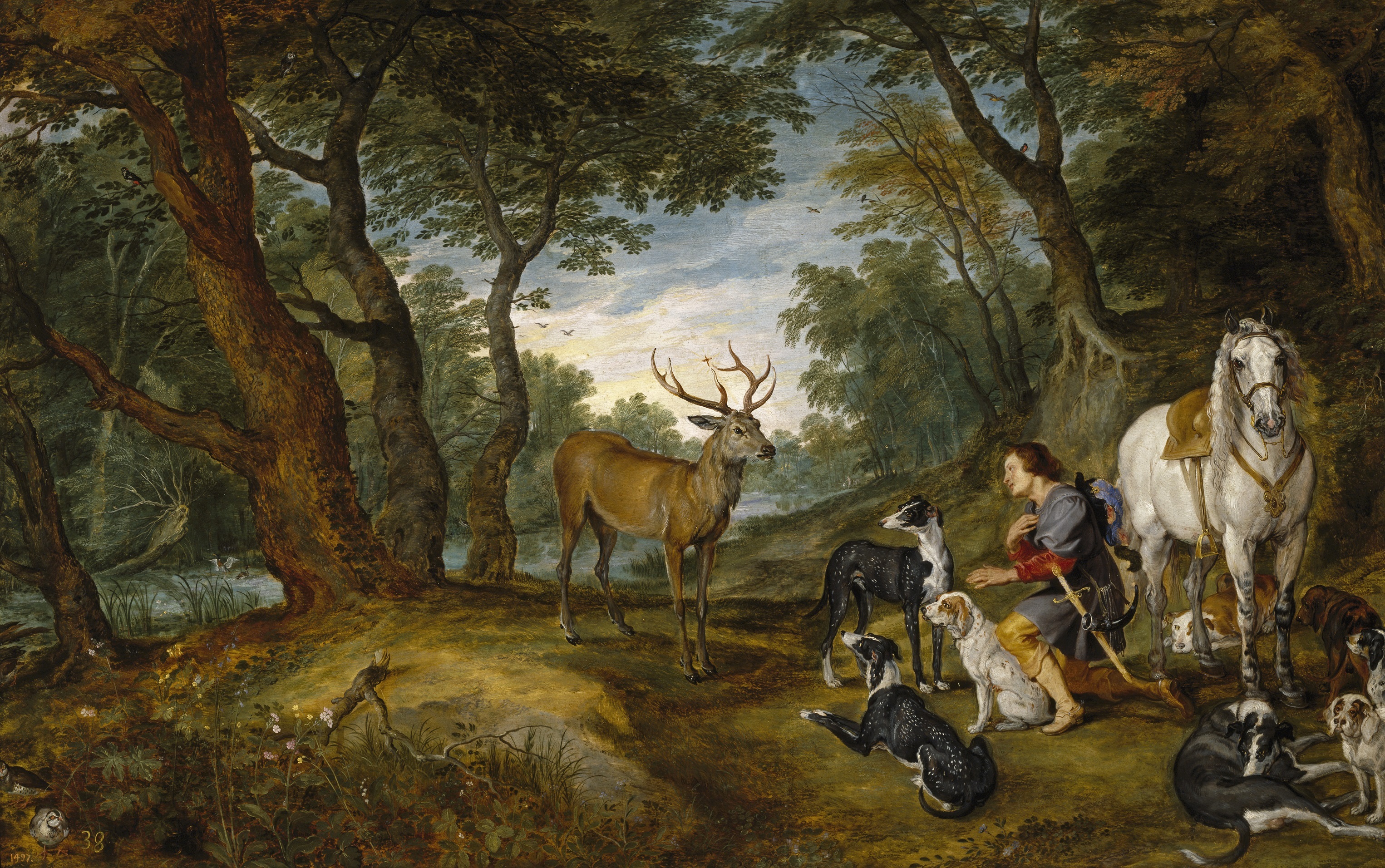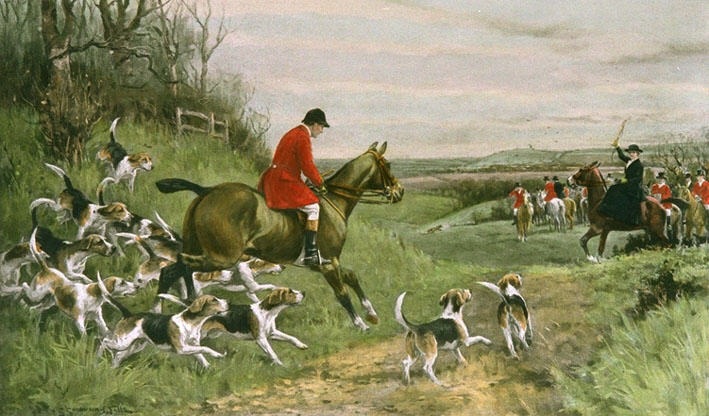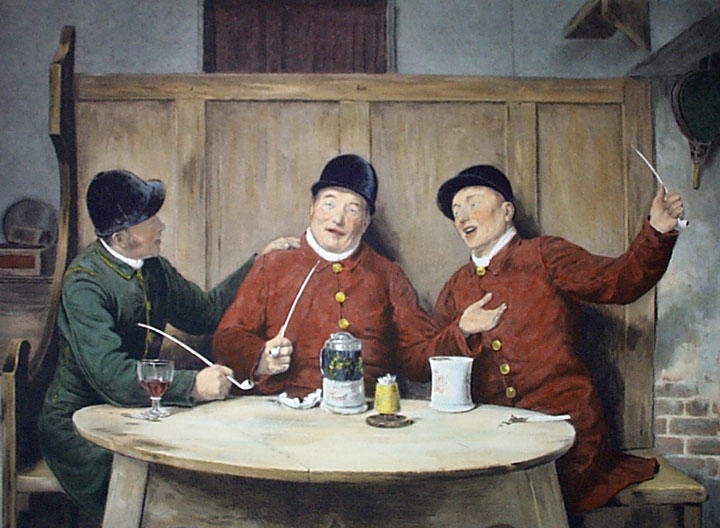
The Feast of St Hubert is on 3 November.
Above is the famous painting by Brueghel the Elder and Peter Paul Rubens called The Vision of St Hubert.
Hubert was the eldest son and apparent heir of Bertrand, Duke of Aquitaine, and was born and lived during the reign of the Merovingian kings of France.
As a youth, Hubert was sent to the Neustrian court of Theuderic III at Paris, where his charm and agreeable address led to his investment with the dignity of "count of the palace". Like all nobles of the time, Hubert was a greater hunter and fond of the chase.
Meanwhile, the tyrannical conduct of Ebroin, mayor of the Neustrian palace, caused a general emigration of the nobles and others to the court of Austrasia at Metz.
Hubert soon followed them and was warmly welcomed by Pippin of Heristal, mayor of the palace, who created him almost immediately grand-master of the household.
About this time (682) Hubert married Floribanne, daughter of Dagobert, Count of Leuven, a great and suitable match. Their son Floribert would later become Bishop of Liège.
Unfortunately, his wife died giving birth to their son, and Hubert retreated from the court, withdrew into the forested Ardennes, and gave himself up entirely to hunting.

Woodcock shooting
On Good Friday morning, when the faithful were crowding the churches, Hubert sallied forth to the chase. As he was pursuing a magnificent stag or hart, the animal turned and he was astounded at perceiving a crucifix standing between its antlers, while he heard a voice saying: "Hubert, unless thou turnest to the Lord, and leadest an holy life, thou shalt quickly go down into hell". Hubert dismounted, prostrated himself and said, "Lord, what wouldst Thou have me do?" He received the answer, "Go and seek Lambert, and he will instruct you". Hubert set out immediately for Maastricht, for there Lambert was bishop. Saint Lambert received Hubert kindly, and became his spiritual director. Hubert now renounced all his very considerable honours, and gave up his birthright to the Aquitaine to his younger brother Odo, whom he made guardian of his infant son, Floribert.
Fox-hounds on the scent
Having distributed all his personal wealth among the poor, he studied for the priesthood, was soon ordained, and shortly afterwards became one of St. Lambert's chief associates in the administration of his diocese. By the advice of St. Lambert, Hubert made a pilgrimage to Rome in 708, but during his absence, Lambert was assassinated by the followers of Pippin. According to the hagiographies of Hubert, this act was simultaneously revealed to the pope in a vision, together with an injunction to appoint Hubert Bishop of Maastricht.
He distributed his episcopal revenues among the poor, was diligent in fasting and prayer, and became famous for his eloquence in the pulpit. In 720, in obedience to a vision, Hubert translated St. Lambert's remains from Maastrict to Liège with great pomp and ceremonial, several neighboring bishops assisting. A basilica for the relics was built upon the site of Lambert's martyrdom, and was made a cathedral the following year, the see being removed from Maastricht to Liège, then only a small village. This laid the foundation of the future greatness of Liège, of which Saint Lambert is honoured as patron, and Saint Hubert as founder and first bishop.
St Hubert actively evangelised among the pagans in the extensive Ardennes forests and in Toxandria, a district stretching from near Tongeren to the confluence of the Waal and the Rhine.
The story of St Eustace is similar.
Prior to his conversion to Christianity, he was a Roman general named Placidus, who served the Emperor Trajan.
While hunting a stag in Tivoli near Rome, Placidus saw a vision of Jesus between the stag's antlers. He was immediately converted, had himself and his family baptized, and changed his name to Eustace (meaning "good fortune" or "fruitful").
A series of calamities followed to test his faith: his wealth was stolen; his servants died of a plague; when the family took a sea voyage, the ship's captain kidnapped Eustace's wife; and as Eustace crossed a river with his two sons, the children were taken away by a wolf and a lion. Like Job, Eustace lamented but did not lose his faith.
He was then quickly restored to his former prestige and reunited with his family; but when he demonstrated his new faith by refusing to make a pagan sacrifice, the emperor, Hadrian, condemned Eustace, his wife, and his sons to be roasted to death inside a bronze statue of a bull or an ox, in the year AD 118.
Both saints are the patrons of hunting.
Some say that their story tells against hunting for that they gave up the chase. Closer analysis reveals a more subtle moral. St Hubert was out hunting on Good Friday instead of repairing to Church. That was impious and a danger to his soul. He had, in effect, abandoned devotion to his faith following his wife's death. God called him back and to a bishopric, since this was what was necessary to his salvation and was his true calling. He now had to "hunt" for souls.
When the hunt was over...
It is an interesting twist of human nature and history that opposition to hunting and belief that animals should be given quasi-human rights is a common harbinger of oppressive totalitarian and heterodox views.
So, in our time, many who oppose hunting animals, even for food, happily support abortion, embryo-experiments and the "hunting" of humans to use in scientific research and "search and destroy" operations against the defenceless child in the womb.
Professor Peter Singer, Australian-born Princeton University philosopher, believes that animals should have rights likes humans and that new-born human babies should not have rights until they are "wanted" or "initiated". For him, man is but one form of animal and no more.
St Hubert and St Eustace, pray for us!
...














.jpg)


























_-002.jpg/220px-Circle_of_Anton_Raphael_Mengs,_Henry_Benedict_Maria_Clement_Stuart,_Cardinal_York_(ca_1750)_-002.jpg)



No comments:
Post a Comment